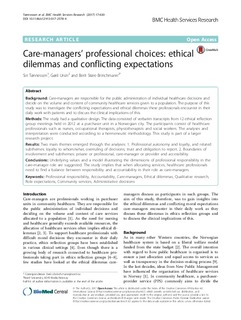Care-managers' professional choices: Ethical dilemmas and conflicting expectations
Journal article, Peer reviewed
Published version
Permanent lenke
http://hdl.handle.net/11250/2484725Utgivelsesdato
2017Metadata
Vis full innførselSamlinger
Sammendrag
Background: Care-managers are responsible for the public administration of individual healthcare decisions and decide on the volume and content of community healthcare services given to a population. The purpose of this study was to investigate the conflicting expectations and ethical dilemmas these professionals encounter in their daily work with patients and to discuss the clinical implications of this.
Methods: The study had a qualitative design. The data consisted of verbatim transcripts from 12 ethical reflection group meetings held in 2012 at a purchaser unit in a Norwegian city. The participants consist of healthcare professionals such as nurses, occupational therapists, physiotherapists and social workers. The analyses and interpretation were conducted according to a hermeneutic methodology. This study is part of a larger research project.
Results: Two main themes emerged through the analyses: 1. Professional autonomy and loyalty, and related subthemes: loyalty to whom/what, overruling of decisions, trust and obligation to report. 2. Boundaries of involvement and subthemes: private or professional, care-manager or provider and accessibility.
Conclusions: Underlying values and a model illustrating the dimensions of professional responsibility in the care-manager role are suggested. The study implies that when allocating services, healthcare professionals need to find a balance between responsibility and accountability in their role as care-managers.

